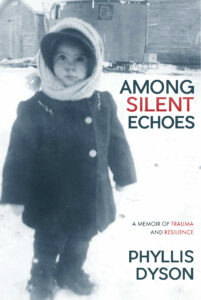 Gratitude is something we are reminded to acknowledge every day. While we are aware that others have lives harder than our own, it’s something else entirely to read about such lives in detail—to attach a human face to the concept and rid ourselves of our own ignorance, if only slightly. Phyllis Dyson’s debut, Among Silent Echoes: A Memoir of Trauma and Resilience (Caitlin Press, 2021), is well-researched and portrays its themes of mental illness with a sympathetic, understanding, and personal perspective. She recounts the story of her life, depicting the impact her mother’s schizophrenia has had—and continues to have—on the way she views the world.
Gratitude is something we are reminded to acknowledge every day. While we are aware that others have lives harder than our own, it’s something else entirely to read about such lives in detail—to attach a human face to the concept and rid ourselves of our own ignorance, if only slightly. Phyllis Dyson’s debut, Among Silent Echoes: A Memoir of Trauma and Resilience (Caitlin Press, 2021), is well-researched and portrays its themes of mental illness with a sympathetic, understanding, and personal perspective. She recounts the story of her life, depicting the impact her mother’s schizophrenia has had—and continues to have—on the way she views the world.
The juxtaposed manner in which Dyson recounts her childhood is reminiscent of the ups and downs of living with someone with a mental illness. While the book is layered with tragedy, Dyson incorporates the good times as well. She is able to help the reader understand the source of her shame and anguish towards her mother’s death, as well as the deep love she possessed for her. Dyson’s voice is extremely present throughout the memoir, switching from one riddled with naïveté and innocence to then commenting on those views with her current wisdom.
The purpose of memoirs is to tell the stories of our lives, but not every life would make for a successful memoir. Similarly, ghostwriters are often commissioned because some stories absolutely need to be told but the authors are not properly equipped to tell them. In my opinion, ghostwriters—although undeniably skilled in their own right—can create a distance between the author and the story. The emotions are less raw, and idiosyncrasies in the author’s voice are formed from mimicry. In this sense, it’s commendable Dyson has decided to tackle a project like this—one that was no doubt intensely emotional, not to mention time-consuming—for her debut.
Her prose and pacing, although sometimes imperfect by traditional standards, adds an intimacy to the story. There’s a sense of a story being told as opposed to read. Dyson’s description, on the other hand, is everything description is meant to be. It is filled with nuance and she has very carefully chosen words packed with connotation to portray just how she was feeling without commenting on the emotions themselves. Her ability to effectively create atmosphere also allows her to play with the emotions of her readers. Though there is wonder associated with her fonder memories, it is often overshadowed by her shocking experiences. Dyson effortlessly conveys her fleeting joys, dragging the reader with her when those happy feelings are ripped away by numerous betrayals, in addition to the abuse she suffered at the hands of her aunt and uncle.
While the beginning and middle tell a tale of heartbreak and hardship, the memoir ends on a hopeful note. The reader can see how Dyson has grown as a person, not necessarily able to forget her trauma but becoming able to cope, now allowing memories of her mother back into her life and into the lives of her children.


A well-written written review by a young writer. Heidi demonstrates insight beyond her years. Can’t wait to see where her writing takes her!